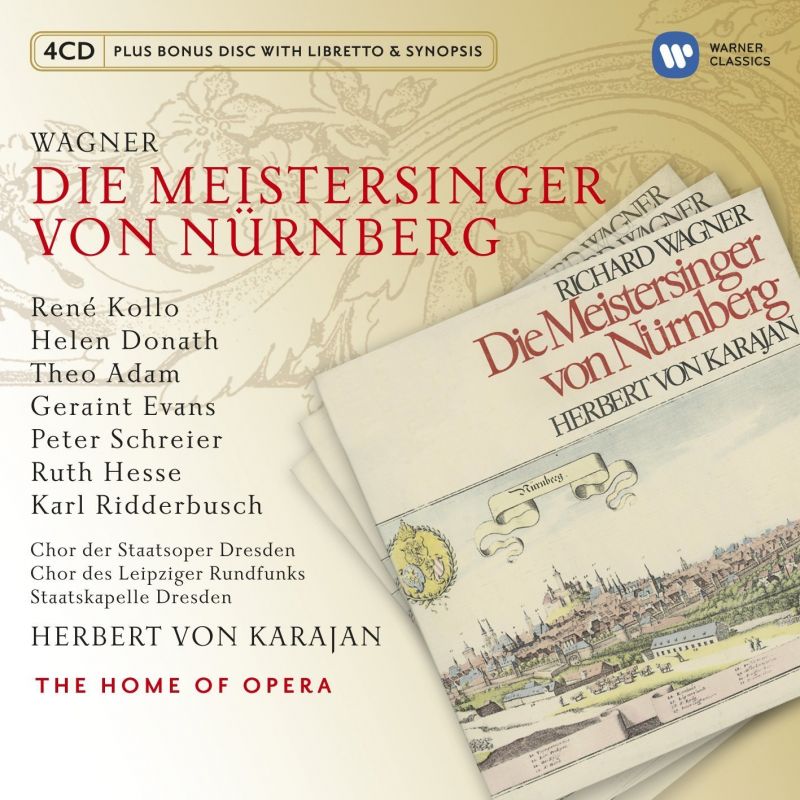Wagner Die Meistersinger von Nürnberg
View record and artist detailsRecord and Artist Details
Composer or Director: Richard Wagner
Genre:
Opera
Label: EMI
Magazine Review Date: 7/1988
Media Format: CD or Download
Media Runtime: 0
Mastering:
ADD
Catalogue Number: 640788-2

Tracks:
| Composition | Artist Credit |
|---|---|
| (Die) Meistersinger von Nürnberg, '(The) Masters |
Richard Wagner, Composer
Dresden State Opera Chorus Eberhard Büchner, Vogelgesang, Tenor Geraint Evans, Beckmesser, Bass Hans-Joachim Rotzsch, Zorn, Tenor Helen Donath, Eva, Soprano Herbert von Karajan, Conductor Hermann Christian Polster, Ortel, Bass Horst Hiestermann, Moser, Tenor Horst Lunow, Nachtigall, Bass Horst Reeh, Schwarz, Bass Karl Ridderbusch, Pogner, Bass Kurt Moll, Nightwatchman, Bass Leipzig Radio Chorus Peter Bindszus, Eisslinger, Tenor Peter Schreier, David, Tenor René Kollo, Walther, Tenor Richard Wagner, Composer Ruth Hesse, Magdalene, Mezzo soprano Siegfried Vogel, Foltz, Bass Staatskapelle Dresden Theo Adam, Hans Sachs, Baritone Zoltan Kélémen, Kothner, Bass |
Composer or Director: Richard Wagner
Genre:
Opera
Label: EMI
Magazine Review Date: 7/1988
Media Format: CD or Download
Media Runtime: 265
Mastering:
ADD
Catalogue Number: 749683-2

Tracks:
| Composition | Artist Credit |
|---|---|
| (Die) Meistersinger von Nürnberg, '(The) Masters |
Richard Wagner, Composer
Dresden State Opera Chorus Eberhard Büchner, Vogelgesang, Tenor Geraint Evans, Beckmesser, Bass Hans-Joachim Rotzsch, Zorn, Tenor Helen Donath, Eva, Soprano Herbert von Karajan, Conductor Hermann Christian Polster, Ortel, Bass Horst Hiestermann, Moser, Tenor Horst Lunow, Nachtigall, Bass Horst Reeh, Schwarz, Bass Karl Ridderbusch, Pogner, Bass Kurt Moll, Nightwatchman, Bass Leipzig Radio Chorus Peter Bindszus, Eisslinger, Tenor Peter Schreier, David, Tenor René Kollo, Walther, Tenor Richard Wagner, Composer Ruth Hesse, Magdalene, Mezzo soprano Siegfried Vogel, Foltz, Bass Staatskapelle Dresden Theo Adam, Hans Sachs, Baritone Zoltan Kélémen, Kothner, Bass |
Author: Alan Blyth
As was his wont, Karajan favoured lighter voices for Wagner than we had been accustomed to, or perhaps he was merely making a virtue of necessity. This has its advantages and its drawbacks. For instance Adam's Lieder-like treatment of Sachs's monologues and duologues have to be set against a tone that wants the warmth and breadth of a Hotter, Frantz or Schoeffler, being more akin to Bailey on the Solti/Decca set. But Adam is wholly believable none the less as poet and cobbler. Rene Kollo, in youthful voice back in 1970, presents a wonderfully fresh, eager slightly arrogant Walther in Acts 1 and 2, just right but—as AP pointed out—lacks the ultimate in breadth and tonal refulgence for the Trial and Prize songs, just Domingo's strength on the Jochum/DG version. However, Kollo is preferable here to his older self with Solti.
Helen Donath's girlish tones depict a young impetuous girl but the radiance of a Reining or a Schwarzkopf in ''O Sachs, mein Freund'' and the lead into the Quintet is missing; indeed, the portrayal is a little shallow. Schreier is a musically adroit, delicate-voiced David without quite the boyish charm of some interpreters. Ridderbusch is a superb Pogner, exhibiting Wagnerian bel canto of a quite special kind and portraying a wise fatherly, firm figure. My chief disappointment on rehearing the performance, and my one disagreement with AP, is over Evans's Beckmesser Throughout, he employs a kind of exaggerated Sprechgesang, using a 'funny' voice to delineate the town clerk's vicious nature. Benno Kusche on the deleted Kempe EMI set and Roland Hermann on the Jochum show that Beckmesser's disaffections can be expressed without resort to such obvious caricature.
The choral singing from the Leipzig Radio Chorus and the Dresden State Opera Chorus is as full and idiomatic as that on any version, and contributes to the general sense of well-being exuded by the whole performance. It is a joy to hear. I set this version alongside the fine DG as my recommendation. It is certainly one of Karajan's most warm-hearted recordings in the operatic field.'
Discover the world's largest classical music catalogue with Presto Music.

Gramophone Digital Club
- Digital Edition
- Digital Archive
- Reviews Database
- Full website access
From £8.75 / month
Subscribe
Gramophone Full Club
- Print Edition
- Digital Edition
- Digital Archive
- Reviews Database
- Full website access
From £11.00 / month
Subscribe
If you are a library, university or other organisation that would be interested in an institutional subscription to Gramophone please click here for further information.





